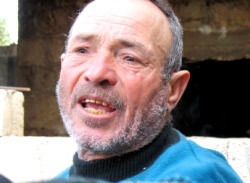Electronic Lebanon 6 March 2007

Muhammad Zein el Abidyn Jaber is a 72-year-old Lebanese farmer who lost his livlihood during last summer’s war. (Photo: Marie Claire Feghali/IRIN)
When Muhammad returned a few weeks later, he found they had died of hunger and thirst. In addition, his tobacco plantation was heavily damaged by the bombings and he was unable to harvest the few olive trees he made a living from because hundreds of unexploded cluster bombs were strewn on his land.
“I was imprisoned for two years by the Israelis in Khiam prison during their occupation of southern Lebanon, which ended on 25 May, 2000. When I got out of prison, I was too sick to do anything except to take the cattle out and to plant tobacco. Besides, our town is too far and I cannot always sell the milk.
“I had 120 sheep, two cattle, a bull and 10 chickens before the war. I took care of them and they took care of me and my family. When the bombing started, my wife Fatma said we should leave. I told her to calm down. ‘It will all be over in a few days,’ I said. ‘Besides, who will take care of the cattle?’
“I’m a farmer and my sheep and cattle are my life. I lost all 120 of them. Every day I would take them out to the field before dawn and return at noon to work at the tobacco plantation with Fatma. The stubborn woman.
“They say Jihad al Binaa [Hezbollah’s unit for assessing damages after the war] are paying the damages, we never got a penny from anyone, except from the Swiss [Agency for Development and Cooperation].
“I’m thankful to the Swiss, they gave me US $1,500, enough to buy a few sheep - but the price of one climbed from $30 a head to $100. I lost cattle worth US $12,000 and what do I get back? Sixty sheep, and I cannot even take them out everywhere [because of the cluster bombs]. I have no cattle, no chickens, no tobacco. What can I do? The stubborn woman.”
“I lost cattle worth US $12,000 and what do I get back? Sixty sheep, and I cannot even take them out everywhere [because of the cluster bombs].”
“My plantation is small but produces good tobacco. This year all my tobacco harvest was burnt out. As for my olive trees, I couldn’t harvest them. The land they were in was littered with cluster bombs. By the time they were cleared, it was too late.
“Every day I wake up early and take the sheep out and I try to rebuild my life. Look at this house, look. The money they gave me wasn’t enough to repair everything so I only restored the barn for my sheep. The woman complained of the leaking [in the house]. I told her spring is coming and the rain will stop. So either she puts a bucket under the leak to catch the water, or she can sleep in the barn.”
This item comes to you via IRIN, a UN humanitarian news and information service, but may not necessarily reflect the views of the United Nations or its agencies. All IRIN material may be reposted or reprinted free-of-charge; refer to the copyright page for conditions of use. IRIN is a project of the UN Office for the Coordination of Humanitarian Affairs.
Related Links
